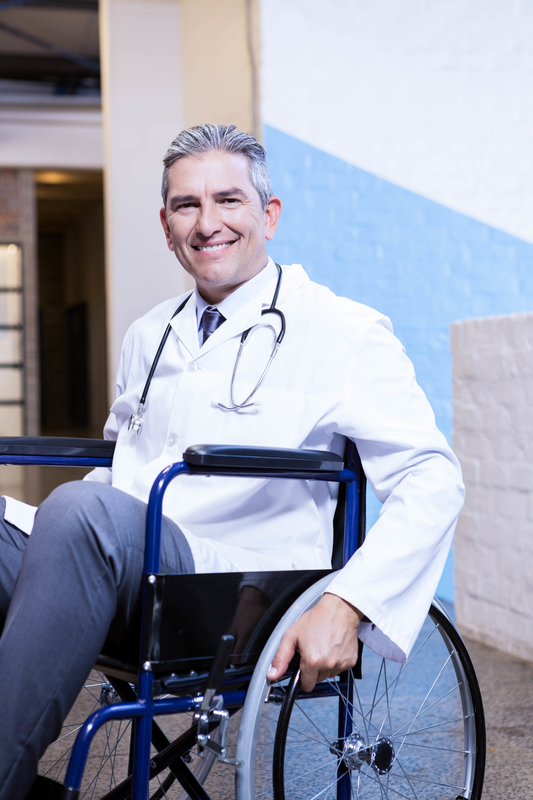In the training and practice of medicine, it’s critical that physicians and other caregivers have a clear understanding of each patient’s unique situation and needs. That’s why diversity in the medical community is a focus of many top schools and hospitals today. According to a newly released report from the Association of American Medical Colleges and the University of California-San Francisco, an area ripe for improvement is in creating a culture that’s increasingly open to students with disabilities.
Case in point: One medical resident with a physical disability was some 18 months into training before the medical institution finally installed an automatic door he needed, he told researchers. Another reported in an initial conversation with his school’s disability representative, the rep allegedly was unfamiliar with the Americans with Disabilities Act.
The report points out that while 19 percent of the US population identifies as being a person with a disability, just 2.7 percent of medical students (about 1,500 of 89,000) have disclosed a disability. That figure falls far below the 11 percent of students with disclosed disabilities in other undergraduate programs and less than half the 7.6 percent of students in graduate programs nationwide. A primary reason may be that medical students are particularly wary of how such a disclosure could impact their professional prospects.
Indeed, many students deliberately hide their disability out of “fear of judgment, bias and skewed perception of ability,” researchers wrote.
Knowing that nearly a fifth of the US population has some disability, “We can predict that a large percentage of our patient population will have disabilities,” the report states. “Increased physician diversity has resulted in positive effects on patient care and access for other marginalized groups, such as low-income people, racial and ethnic minorities, and non-native English speakers. Our belief is that similar benefits can result from educating and employing physicians with disabilities.”
Welcoming caregivers with disabilities into the profession certainly isn’t a new idea, as evidenced by a letter penned by Harvey Cushing, MD, the father of neurosurgery, to fellow physician Henry Christian in 1911.
“I would like to see the day when somebody would be appointed surgeon somewhere who had no hands,” Cushing wrote more than a century ago. “For the operative part is the least part of the work.”
So how can medical schools help improve inclusion of promising medical students with disabilities? Authors of the report compiled a list of both structural and cultural recommendations, including:
Structural Recommendations
- Designating and providing resources for disability service providers who are knowledgeable about medical education
- Publicizing clear, accessible policies and processes
- Providing access to appropriate accommodations
- Reviewing and revising technical standards in light of current promising practices
- Normalizing help-seeking behaviors and facilitating access to wellness services
Cultural Recommendations
- Regularly assessing institutional polices, processes, services, and physical space
- Providing ongoing professional development for faculty and staff
- Integrating best practices in disability, as well as accessible and respectful language, into curricula and pedagogy
- Infusing disability into all diversity and inclusion initiatives
- Making information about disability services and accommodations easily accessible
- Reviewing recruitment and hiring practices
- Taking a universal design approach to both physical space and learner activities and experiences
“I hope this report sparks critical conversations about disability inclusion in medical education and serves as a beacon for students with disabilities who aspire to be physicians but who had thought the barriers were too big to overcome,” says Lisa Meeks, Ph.D., who conducted the research while at the UCSF School of Medicine. Meeks is now on the faculty at the U-M Medical School. “I also hope it inspires educators to think broadly about how disability intersects with medicine, including how physicians care for the one in five patients who have disabilities.”
If you’re a current or prospective medical student, WOLFPACC can help assure the competitive edge you’ll need in your studies and subsequent career. Our small COMLEX and USMLE review classes and one-on-one tutoring allow for the intense personal attention that can help make a difference in your success. Call 904-209-3140 to learn more.




